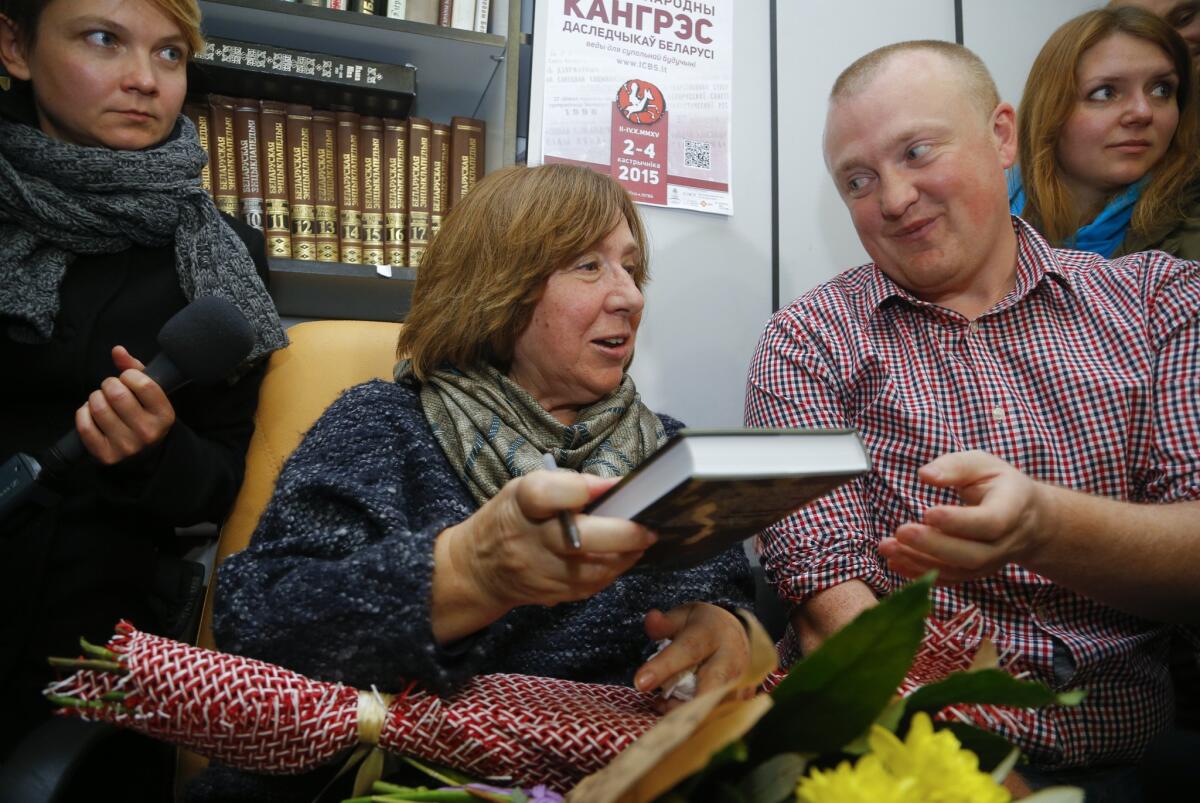‘Finally the rest of the world has noticed us’: A Nobel prize in Belarus

Svetlana Alexievich signs autographs after her news conference in Minsk.
- Share via
Reporting from Minsk, Belarus — As news that Belarus’ Svetlana Alexievich had been awarded the Nobel Prize for literature spread across Minsk on Thursday, perhaps nowhere was the sense of pride more palpable than at Lohninau, a small, Belarusian language bookstore tucked in an alley off Victory Square.
“She’s won, she’s won!” a female customer exclaimed as she rushed outside the tiny shop’s entrance and threw her arms around a group of friends. “Have you heard? Our Svetlana has won!”
The timing of Alexievich’s award couldn’t have been more pointed or poignant for a nation preparing for a presidential election Sunday, where the results are considered by most to be a foregone conclusion in favor of longtime President Alexander Lukashenko.
See the most-read stories this hour >>
“This is important for Belarus,” said Aleksey Alikhanov, an artist who was rushing to a gallery exhibition. “Finally, the rest of the world has noticed us, and can see that we are cultured, intelligent people here.”
Lukashenko has ruled the former communist country for more than two decades with a Soviet-style iron fist. His government has imprisoned opposition figures and silenced free speech. Political protests have ended in violent clashes with police in which thousands have been arrested.
The United States has placed economic sanctions on Lukashenko and many Belarusian state enterprises for the country’s human rights violations.
At times, promoting the use of the Belarusian language has been prosecuted for being antigovernment in a country where Lukashenko has declared Russian the national language.
The trials and tribulations of Belarusians are, in fact, the kind of subjects on which Alexievich, 67, has built her literary career.

Alfred Nobel, the founder of the Nobel Prizes, channeled his interest in peace-related endeavors toward awards in science, medicine and the fraternity of nations.
Born in 1948 in the western Ukrainian city of Ivano-Frankivsk to a Belarusian father and a Ukrainian mother, Alexievich’s family later moved to Minsk, where she began writing eloquent stories of Soviet and post-Soviet lives, people struggling through some of the region’s most tragic and brutal historical moments.
In “Voices of Chernobyl,” published in 2005, Alexievich chronicled in heartbreaking detail the lives of survivors of the 1986 nuclear power plant fire. In 1992’s “Zinky Boys,” she described the impact of the Soviet war in Afghanistan through the eyes of soldiers’ mothers. Both books told the stories of common people with honesty and outrage.
Over the years, Alexievich lived outside Belarus when her work fell out of favor of Lukashenko’s heavy-handed government.
“The Belarusian government is acting like I don’t exist,” she told a tightly packed news conference here Thursday. “I can’t remember a time when the Belarusian media has called me.”
SIGN UP for the free Essential Arts & Culture newsletter >>
Subtly showing her fondness for the opposition, Alexievich chose to give her first public appearance Thursday at the Nasha Niva newspaper office. The publication is one of the few news outlets publishing in Belarusian, and is seen as an alternative to the dominant state-run or -influenced press.
Alexievich said she was ironing a shirt at home when the call came in from Sweden informing her that she had been awarded this year’s Nobel prize.
“I haven’t cried yet, I’m still waiting for that to happen, to tell you the truth,” she said.
Outside the paper’s tiny first-floor office, Alexievich said she was worried about the country’s future, but would not be voting in Sunday’s election, because the outcome in favor of Lukashenko was already guaranteed.
Belarus’ economy is heavily dependent on neighboring Russia, which sells oil and gas to Minsk at below-market rates. Russian loans to Belarus in exchange for Lukashenko’s loyalty to the increasingly authoritarian Kremlin have allowed the country to continue to pay social benefits to its citizens and subsidize the country’s mostly state-owned enterprises.
But as the economy in Russia has buckled under pressure from Western sanctions and lower oil prices, so, too, has Belarus’ budget.
“I’m afraid we will not see freedom here for a long time,” the petite red-haired author said. “People are afraid of what they saw happen in Ukraine. They are afraid to go out into the streets.”
Last year, Belarusians watched in shock as Russia’s annexation of the Crimean peninsula from Ukraine unfolded, many fearing that any political dissent could lead to a violent reprisal from Lukashenko.
The announcement Thursday about Alexievich’s honor seemed to at least temporarily overshadow pessimism about Sunday’s election and regional tension in Ukraine and Russia.
“Alexievich’s Nobel Prize is the real event of the year, not the elections,” Vitali Tsyhankou, a Belarusian political journalist, said in an interview.
Ayres is a special correspondent.
More to Read
Sign up for Essential California
The most important California stories and recommendations in your inbox every morning.
You may occasionally receive promotional content from the Los Angeles Times.











